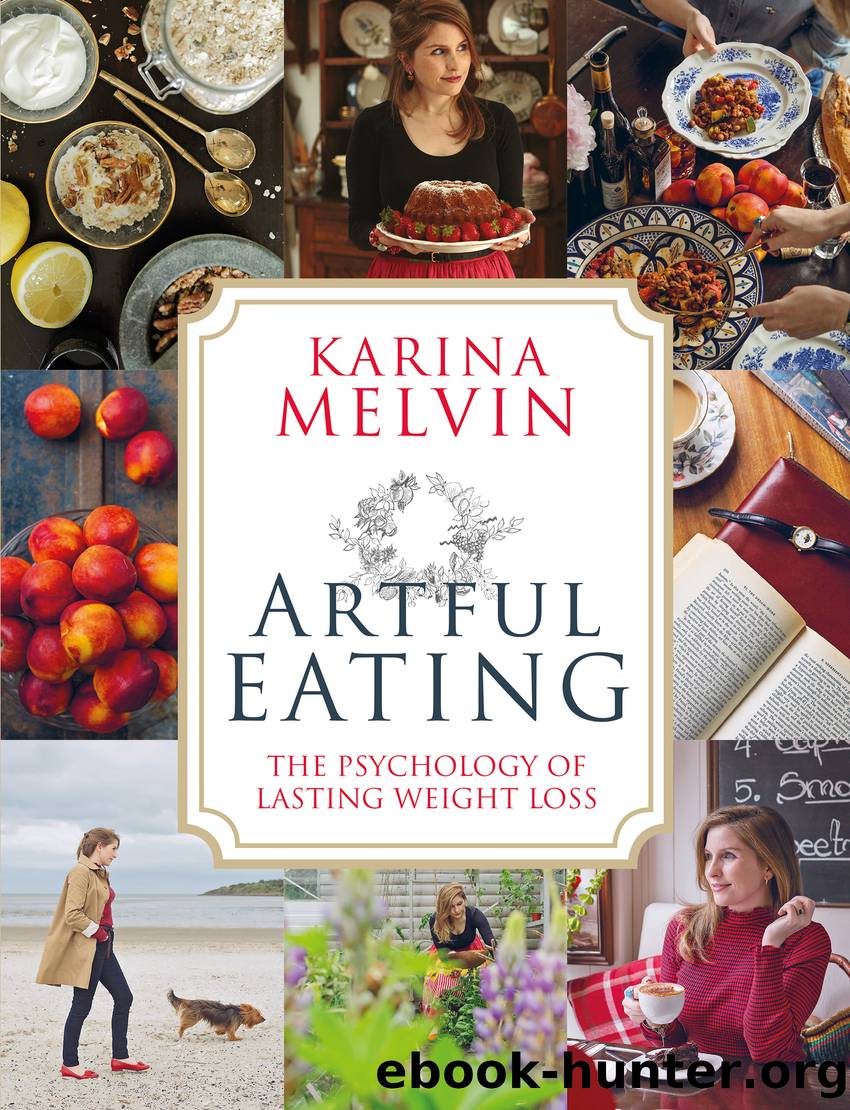Artful Eating by Karina Melvin

Author:Karina Melvin [Melvin, Karina]
Language: eng
Format: epub
Tags: Lifestyle
Publisher: Black & White Publishing
Published: 2017-11-02T16:00:00+00:00
In this chapter we are going to get practical. I want to enthuse you with a sense of the importance of both physical and psychological well-being, as these two aspects are central to the Artful Eating philosophy. The daily rituals I advocate will help you practise self-love and self-respect and set you up for success. I think perhaps the most important lesson I’ve learned in my life so far – and it’s one my clients have taught me – is to love yourself. Love and treat yourself like you love and treat those special people in your life: your children, family, friends and pets. Self-love is not a narcissistic pursuit; it is a necessary baseline for feeling good, enjoying life and enjoying others. Looking good is a happy consequence.
It may take a bit of effort to begin with, but allowing yourself to look in the mirror and focus on the good bits, not the flaws, is a lovely start. Instead of homing in on the thing you did wrong, focus for a couple of seconds on the thing you did right. When we love and respect ourselves we are much more inclined to do things that serve us, like eating well, minding our physical health and believing we can achieve our goals.
Research within the field of Positive Psychology has a lot to contribute to this idea of being in a position of self-love, which actually facilitates feeling happy and achieving your goals. If you ask someone why they are unhappy, they will usually tell you about something which is going on in their external world, or they’ll say it’s because of their genes: they have a family history of mental illness, or obesity, or a neurochemical imbalance. The current understanding is that we are a result of our genes and our environment.
When researching happiness, however, positive psychologists found that long-term happiness is actually very difficult to predict when looking at one’s external circumstances. Taking into account all the major external factors, for example how much money you make, where you live, what your education level is, whether you’re married or not, how many children you have and so on, it is possible to predict short-term happiness with a great degree of accuracy. For example, if you eat a chocolate bar, you will feel happier, but five minutes later you may think, ‘Why did I do that?’
But when looking at long-term levels of happiness, or your joy and well-being over a longer period of time, psychologists can only predict 10 per cent of the variability of happiness amongst people. In the long term, happiness is not about your external circumstances; it’s about how your brain processes the world you find yourself in.[1]
How you process the life you have, the size you are and, most importantly, your relationship with yourself, is to do with the position you take up in the world, not your circumstances. If you change the lens through which you view the world and your experience of it, you will actually dramatically increase your level of happiness, well-being and self-love.
Download
This site does not store any files on its server. We only index and link to content provided by other sites. Please contact the content providers to delete copyright contents if any and email us, we'll remove relevant links or contents immediately.
Potatoes Not Prozac by Kathleen DesMaisons(349)
Breaking Free from Emotional Eating by Geneen Roth(348)
Help Yourself: Master Your Emotional Eating: Your Permanent Overeating Cure by Beran Parry(309)
Artful Eating by Karina Melvin(300)
Intuitive Eating for Every Day by Evelyn Tribole(275)
Gastric Band Hypnosis for Rapid Weight Loss: Avoid the Risk of Gastric Band Surgery, Burn Fat, and Get Rid of a Food Addiction and Emotional Eating With Affirmations, Meditations, and Self-Hypnosis by Melanie Taylor(263)
Overeating and Binge Eating Beating Emotional Eating The Easy Way by Speedy Publishing(262)
Get Moving! by Shwetambari Shetty(260)
Stories of Extreme Picky Eating by Jennifer Friedman(233)
Gastric Band Hypnosis for Rapid Weight Loss: Avoid the Risk of Gastric Band Surgery, Burn Fat, and Get Rid of a Food Addiction and Emotional Eating with ... You Burn Fat & Increase Your Confidence) by Melanie Taylor(220)
